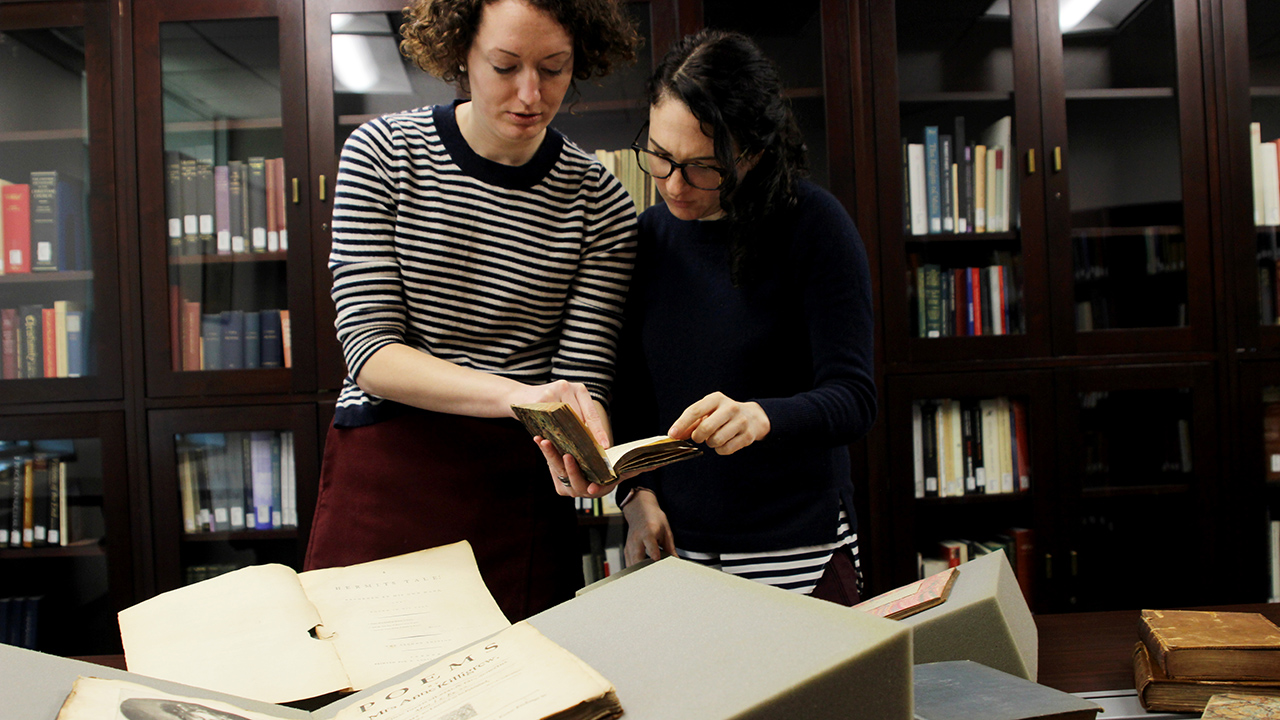- YouTube
- TikTok
The secret life of books
OU professors awarded fellowship to explore ‘past lives’ of books in Marguerite Hicks Collection

Oakland University professors Emily Spunaugle and Megan Peiser were recently awarded the Bibliographical Society of America (BSA) and the American Society for Eighteenth-Century Studies (ASECS) Fellowship for $3,000 for their project, Gender, Disability, and Finding Women in the Archives: Establishing the Provenance of the Marguerite Hicks Collection, 1660-1820.
“The Collection was acquired in 1971 of Detroit collector Marguerite Hicks and her partner Thelma James, a retired folklorist from Wayne State University,” said Spunaugle, an assistant professor and humanities librarian at OU.
“It contains about 900 books, plays, literary works, broadsides, pamphlets, conduct manuals, religious texts, medical and cookbooks, travel literature, biographies, and more, from the 17th through 19th Centuries, including many books that are not held elsewhere in the world,” she added.
Working in collaboration with Peiser, an assistant professor of English at Oakland University, their research has focused on establishing the provenance, or history of ownership, of the items in the Marguerite Hicks Collection of Books by and about Women.
“Hicks and James amassed the collection from English booksellers from the late 1930s into the 1950s,” Spunaugle said. “The Collection is likely one of the earliest intentional collections of women authors by an American collector. Even so, little is known about the collecting methods and ‘previous lives’ of the books within the Collection.”
Using the scant evidence in the books themselves — prices written in the covers by booksellers, odd receipts laid in the books, and Hicks’ own notations — Peiser and Spunaugle have created a list of booksellers from whom the Collections were purchased.
“We plan to use the money to travel to the British Library in London this summer to consult the archives of the Maggs Brothers, booksellers in the late 1930s from whom Hicks and James purchased many of their books,” Spunaugle said. “The Maggs Brothers archives contain substantial correspondence between the bookseller and Thelma James, who handled much of Hicks’ correspondence due to failing eyesight.”
According to Spunaugle and Pesier, the research at the British Library will be “invaluable for understanding Hicks’ goals as she built her collection,” as it will provide information about the price, condition and focus of the titles Hicks sought to acquire.
“While this is but one prong of a much larger research project, Dr. Peiser and I hope to introduce Marguerite Hicks to the scholarly community as a silenced, overlooked, albeit prescient collector and scholar of early English women’s writings,” Spunaugle said.
To learn more about the Bibliographical Society of America, visit https://bibsocamer.org. To learn more about the American Society for Eighteenth-Century Studies, visit www.18thcenturysociety.org.


 March 12, 2019
March 12, 2019